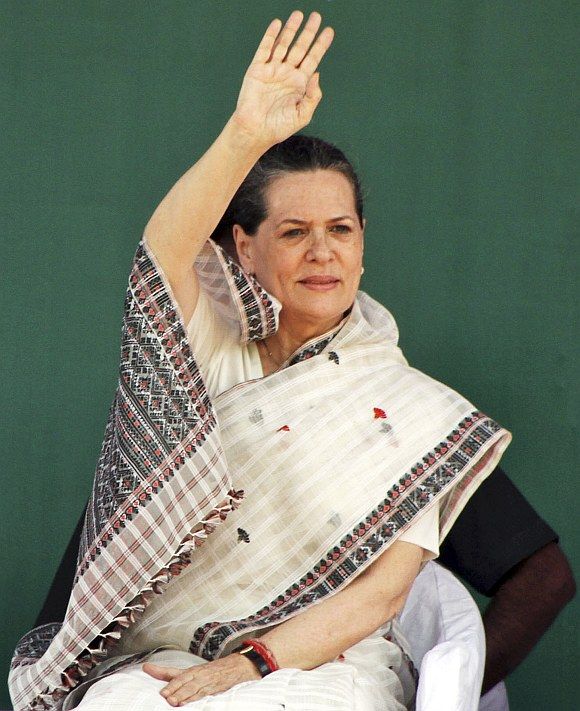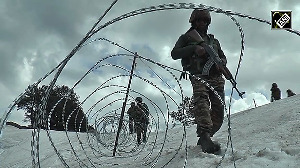 While admitting that it is early to predict how the leadership issue will pan out in the coming months, Congress insiders maintained that in the present situation, it appears highly unlikely that Sonia will be able to retire by the given deadline says Anita Katyal
While admitting that it is early to predict how the leadership issue will pan out in the coming months, Congress insiders maintained that in the present situation, it appears highly unlikely that Sonia will be able to retire by the given deadline says Anita Katyal
As the Congress begins preparations for its organisational polls after its recent humiliating electoral defeat, it appears increasingly doubtful that party president Sonia Gandhi will be able to stick to her earlier plans to abdicate in favour of her son and party vice-president Rahul Gandhi when her five-year term ends next year.
Although there has been no official word in this regard, party insiders had so far maintained that Sonia was all set to call it a day and hand over the baton to Rahul when the party president’s election is held in December 2015.
The process was set in motion in January 2013 at the All India Congress Committee session in Jaipur when Rahul was appointed party vice-president, one step away from his formal election as party president next year.
However, the process of this generation change in the Congress has slowed down after the party’s crushing defeat in the recently-concluded Lok Sabha elections. There is widespread disillusionment with Rahul’s capabilities to lead the party or connect with the masses.
While admitting that it is early to predict how the leadership issue will pan out in the coming months, Congress insiders maintained that in the present situation, it appears highly unlikely that Sonia will be able to retire by the given deadline.
“The Congress rank and file is looking up to her to revive the party….they need her at the helm at this critical juncture,” a senior Congress leader told rediff.com.
Consequently, Sonia has been forced to step up her engagement in the party. Her first task has been to involve the party’s old guard who had been feeling marginalised after Rahul’s elevation. This is not to suggest that Rahul is completely out of the picture, but he has taken a backseat for the time being.
“Sonia’s top priority today is to boost the morale of party workers and strengthen the organisation,” a Congress functionary told rediff.com.
Sonia indicated her readiness to play a more proactive role on her first visit to her Lok Sabha constituency Rae Bareli last week.
“We will have to win back the confidence of the people in areas where the party has lost and I will lead from the front in this task…we will not stop till we have regained the party’s glory,” she told party workers in Rae Bareli.
With the Congress recording its lowest tally in the Lok Sabha, Sonia has been forced to fall back on the services of the old guard while Rahul has chosen to occupy the back benches.
Ignoring the demand from the ranks that Rahul should lead the party in the Lok Sabha, Sonia decided to repose faith in old-timer Mallikarjuna Kharge while another senior Amarinder Singh was named deputy leader.
It was the same story in the Rajya Sabha where the experienced and well-networked Ghulam Nabi Azad was appointed leader and old party loyalist Anand Sharma was made deputy leader.
It was Sonia, and not Rahul, who decided to entrust the responsibility of taking on the ruling alliance to the party’s experienced leaders. At the same time, Sonia has been meeting party workers, state leaders and former members of Parliament on a regular basis to get their feedback about the reasons for the party’s defeat and their suggestions for the future roadmap.
Known as the Nehru-Gandhi family party, the generational shift in the Congress was widely expected to be a smooth affair as there was never any debate about who would succeed party president Sonia. There was widespread acceptance in the Congress that Rahul was the party’s heir. With no other challenger, it was never a question of who would lead the Congress but when would Rahul be ready to assume a larger role in the party given his perceived reluctance to handle greater responsibilities.
It was after considerable prodding from the rank and file that Rahul was elevated as Congress vice-president at last year’s Jaipur AICC session, signaling the emergence of a new and young leader.
Rahul’s promotion predictably raised expectations among the cadres who believed his charismatic leadership would restore the party’s credibility which had been badly dented after the Congress-led United Progressive Alliance government came under severe attack for corruption scandals, weak leadership and its inability to rein in inflation.
As it happened, Rahul failed to deliver. Consequently, demoralised party cadres are now depending on Sonia to revive the party’s fortunes.
AICC general secretary Janardan Dwivedi maintained that now that elections are over, the leadership’s top priority is to strengthen the organisation and begin work on party elections which are slated for next year, adding that state units are being directed to complete their membership drive for this purpose.
Dwivedi admitted that when a party is in power, the organisation invariably gets neglected. Now the Congress has time on its hands, he said, it should take full advantage of this opportunity and work wholeheartedly in strengthening the organisation.
“If we apply ourselves to this task, there is no reason for the Congress to rise once again,” he added confidently. With Sonia exercising greater control over party affairs, there is also a question mark over Rahul’s plans to do away with the nomination culture and hold internal elections as he did in the Youth Congress and the National Students Union of India.
Dwivedi maintained there is no hard and fast rule in this, adding that it is preferable that the party president is decided through a process of consensus to avoid any bickering.







 © 2025
© 2025